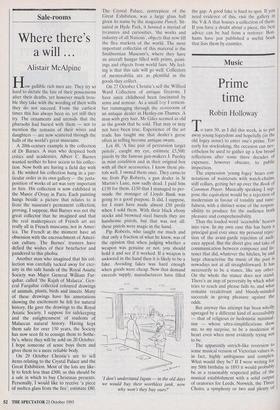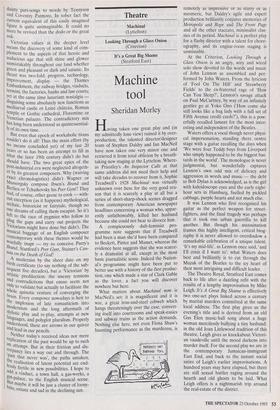Music
Prime time
Robin Holloway
To turn 50, as I did this week, is to put away young fogeydom and hopefully (in the old fogey sense) to enter one's prime. Too early for stocktaking, the occasion can nev- ertheless be used to gather up a few broad reflections after some three decades of exposure, however obscure, to public inspection.
The expression 'young fogey' bears con- notations of waistcoats with watch-chains, stiff collars, getting het up over the Book of Common Prayer. Musically speaking I sup- pose the equivalent would be a rejection of modernism in favour of tonality and tune- fulness, with a distinct sense of the respon- sibility to produce for the audience both pleasure and comprehensibility.
Thus the loaded word 'accessible' heaves into view. In my own case this has been a principal goal ever since my personal rejec- tion of the avant-garde rejection of audi- ence appeal. But the direct give and take of communication between composer and lis- tener that did, whatever the hitches, by and large characterise the music of the past is nowadays not at all straightforward. It has necessarily to be a stance, like any other. On the whole the stance does not stand. There's an imp of perversity by which what tries to reach and please fails to, and what remains recalcitrant and bloody-minded succeeds in giving pleasure against the odds.
But anyway this attempt has been wholly upstaged by a different kind of accessibility — that of religious or hedonistic minimal- ism — whose ultra-simplifications show me, to my surprise, to be a modernist at heart even when most evidently trying not to be.
The apparently ostrich-like reversion to some musical version of Victorian values is, in fact, highly ambiguous and complex. What would they be? If I were writing for my 50th birthday in 1893 it would probably be as a reasonably respected pillar of the musical establishment with a solid output of oratories for Leeds, Norwich, the Three Choirs, a symphony or two and plenty of dainty part-songs to words by Tennyson and Coventry Patmore. In sober fact the current equivalent of this easily imagined figure is quite unimaginable. It could no more be revived than the dodo or the great auk.
Victorian values at the deeper level means the discovery of some kind of com- plement to the aspects of that heroic and audacious age that still shine and glower unmistakably throughout our land whether green and pleasant or dark and satanic. Its thrust was two-fold: progress, technology, improvement, display — the Thames Embankment, the railway bridges, viaducts, termini, the factories, banks and law courts; yet at the same time luxuriant nostalgia disguising some absolutely new functions as mediaeval castle or Loire château, Roman temple or Gothic cathedral, Florentine or Venetian palazzo. The contradictory mix has long been understood as quintessential- ly of its own time.
But even that epoch of workaholic titans Couldn't do it all! Thus the main effort (by no means concluded yet) of my last 20 Years or so has been an attempt to fill in what the later 19th century didn't do but should have. The two great epics of the Post-industrial era were neglected altogeth- er by its greatest composers. Why (waiving exact chronologistics) didn't Wagner or Mussorgsky compose Ibsen's Brand and Berlioz or Tchaikovsky his Peer Gynt? They had, of course, other geese to cook — with- out exception (as it happens) mythological, archaic, historicist or fairytale, though no one dreams of calling them escapist. So it's left to the race of pygmies who follow to Plug the gaps and carry out projects the Victorians might have done but didn't. The Musical baggage of an English composer Contemporary with these themes would be Woefully inapt — try to conceive Parry's Brand, Stanford's Peer Gynt, Stainer's Can- tata on the Death of God!
birth modernist by the sheer date on my 'lrrh certificate (to say nothing of the sub- sequent five decades), but a 'Victorian' by artistic predilection: the uneasy tensions and contradictions that ensue seem not Only to validate but actually to facilitate the !hole quixotic venture of converging the rFain. Every composer nowadays is heir to the implosion of late romanticism into modernism and the long aftermath of stylistic play and re-play, attempts at new lnguages, and polyglot pluralism. Properly understood, these are arrows in our quiver and lead in our pencils. Neither today's received ideas nor mere replication of the past would be up to such an attempt. But in their friction and dis- crepancy lies a way out and through. The past that never was', the paths untaken, the realisation of latent potential are end- lessly fertile in new possibilities. I hope to add a viaduct, a town hall, a gas-works, a Wu-Palace, to the English musical scene. but maybe it will be just a cluster of loony- Ins, ornate and sad in the declining sun.



































































 Previous page
Previous page